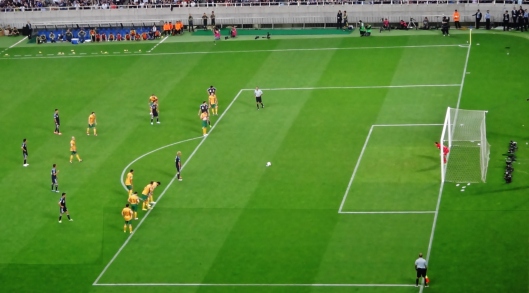(Since I’m blogging in London I’m calling it football, not soccer. Sorry, ‘merica).
(photo courtesy Clark Parker/TheTokyoFiles.com)
I was a (very) casual football fan for years but since moving to the U.K. three years ago, I’ve paid much closer attention to the sport. And while most of it is just fine, I’m troubled by the role played by penalties.
Penalties are highly entertaining and, because they’re awarded by the referee, incredibly arbitrary. Many penalties that should be called are not, and many are called that shouldn’t be. Players flop and dive with abandon, hoping to win one. It is not one of the game’s more attractive aspects.
The problem is the disproportionate role penalties can play, given their capricious nature. While an NBA referee will blow some calls, costing a team one or two points, they tend to get evened out in a game where both teams are likely to score in the hundreds. In the English Premier League last year, teams averaged a 2.7 goals a game (that’s a combined 2.7 goals) and more than 60 percent of the matches were decided by one goal (or were draws). In that context, penalties can, and often will, decide the outcome.
Penalties aren’t automatic (just ask Jason Puncheon) but they’re close: players convert on 85 percent of them, on average. That’s better than the NBA’s average free-throw rate.
Here’s how to fix it:
1, Let the punishment fit the crime
Penalty takers are so successful in part because of who takes them: very often the team’s best scorer. There’s no rule specifying who takes the penalty, so naturally the most gifted shooter lines up. This both pads the scoring statistics for strikers (bizarrely, the records don’t distinguish between earned goals and penalties) and undermines the whole logic of the punishment. If the penalty is an attempt to compensate teams for lost scoring opportunity, then shouldn’t the player who lost the chance take the shot? In other words, shouldn’t the punishment fit the crime?
A minimum fix to the problem of penalties would be to require the fouled player to take the shot. If he’s too injured to take it – unlikely, given that he may not have been touched in the first place – then he should come off the field for a substitute. It wouldn’t make a big dent in the success rate, but at least justice will be served. (The same logic applies to free kicks, as well.)
2, Move the penalty mark back two yards
Sports need to adapt to changing conditions, and can’t be too rooted to traditions. If baseball can raise and lower the pitchers mound, football can tinker with the penalty mark. Another two yards will give the keeper a fraction of a second longer to block the shot, and help even the odds. If that doesn’t work, move it back four yards.
3, Stop counting penalties in the scoring statistics
This is more of a philosophical point than remedy, but it would help remind fans (and the wildly celebrating players) that scoring a penalty kick isn’t the same as scoring a goal. A few weeks ago Wayne Rooney scored his 50th goal for England to become the nation’s all-time leader … on a penalty. It shouldn’t count. While the outcome of a walk is the same as a single (going back to baseball), they’re not the same and aren’t treated as such in the stats. Last year, Sergio Aguero of Manchester City won the Golden Boot with 26 goals. Only in the fine print does it say he scored five of them on penalties.
4, Institute retroactive red cards
This isn’t a new idea, but it’s a good one. To crack down on diving, football should institute a tribunal that examines video after the game. If a player is found faking a foul, he should be given a red card for his next match. (Some noble fans argue the game should be paused to assess the foul as they occur. You can sign their petition here). The NBA has a very mild version of this in place to clamp down on flopping. Stiff penalties for diving means there will be less of it, and referees, having more confidence that they’re making the right decisions, will be more likely to call the legitimate fouls. It may not reduce the number of penalties, but it will make them less arbitrary.


In general I agree that penalties can be very arbitrary, but, in certain cases they are well-deserved. The photo from the post is from a Japan/Australia world-cup qualifier in 2013. This penalty was awarded for a clear handball…I could see it from the stands, and for a moment I was afraid the refs wouldn’t make the right call.
The minutes leading up to the penalty kick are some of the most exciting moments in my life of watching sport. The tension, then kick, then tens of thousands of Japanese fans erupting with joy. It was incredible. God bless the penalty kick!